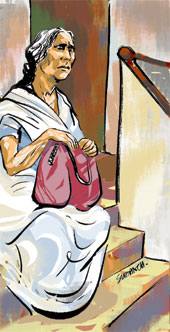 |
But for this to happen, the Older Persons (Maintenance, Care and Protection) Bill, 2005, that has been mooted by the UPA government, must come into force. The idea is to “compel the progeny to perform the responsibilities which they have towards their parents in their old age.”
There are provisions in the law books that guarantee maintenance to dependent parents but the procedure is complex and extremely slow. Section 125 of the Criminal Procedure Code (CrPC) says that children are bound to look after their old parents. But, according to experts, this is more of a moral and ethical responsibility than a legal compulsion. Earlier, maintenance expenses could only be claimed from the son. After an amendment, it can now be claimed from daughters too. Even non-governmental organisations (NGOs) can file cases on behalf of aggrieved parents.
Allowance can also be claimed under Section 12 of the Human Rights Protection Act, 1993. The Hindu Adoption and Maintenance Act, 1956, has provisions for parents too. But here, certain conditions have to be fulfilled. Section 20 (3) of the Act states that old parents can seek maintenance when they are unable to maintain themselves out of their earnings or from other property. Most cases filed under this Act are settled out of court, since it is difficult to prove that a parent is unable to support himself or herself.
Seniors can also seek remedy from the Lok Adalat (people’s court). “But Lok Adalats can only take up pending cases that have been referred to them. Essentially, they provide pre-litigation counselling and can’t deliver a judgement. We need a transparent law that clearly lays down the rights of the parents. Only then can children be forced to take responsibility,” says senior lawyer and executive chairman of West Bengal’s Legal Aid Services Geetanath Ganguly.
Ganguly cites the example of a case that was referred to the Lok Adalat. A 65-year-old woman was packed off to Benaras by her son where she begged on the streets. The son lived in a huge apartment in Calcutta and refused to take her back even after he was informed of his mother’s plight. “We urged the woman to file a case of maintenance but she refused to take her son to court. Even if she had done so, it would have been difficult to make out a strong case for her as the law is weak and the case might have dragged on for years,” says Ganguly.
The new tribunals and the law should change all that. And the speedy disposal of cases could make the real difference. The key factor, however, is how fast these cases are dealt with, for parents are short on resources, says lawyer Prasun Mukherjee. “Unless the six-month deadline is adhered to, this will be just another toothless Act,” he says.
Others, like criminal lawyer Joymalya Bagchi, believe the new law won’t make a huge difference. “Under section 125, you can claim maintenance from your children. I don’t think cases take unusually long to be disposed of. This new law, in all likelihood, is going to be a reiteration of the same thing,” he says.
But will the new law bypass the social stigma attached to aged parents reporting children to the authorities? That, after all, is what has been diagnosed as the main reason many parents prefer to suffer in silence rather than take legal recourse. Says barrister Arijit Banerjee, “Just making the whole thing easier and faster won’t make that happen. This calls for an attitudinal change that has to come gradually. But, of course, more people will explore the legal option if it becomes less messy.”











